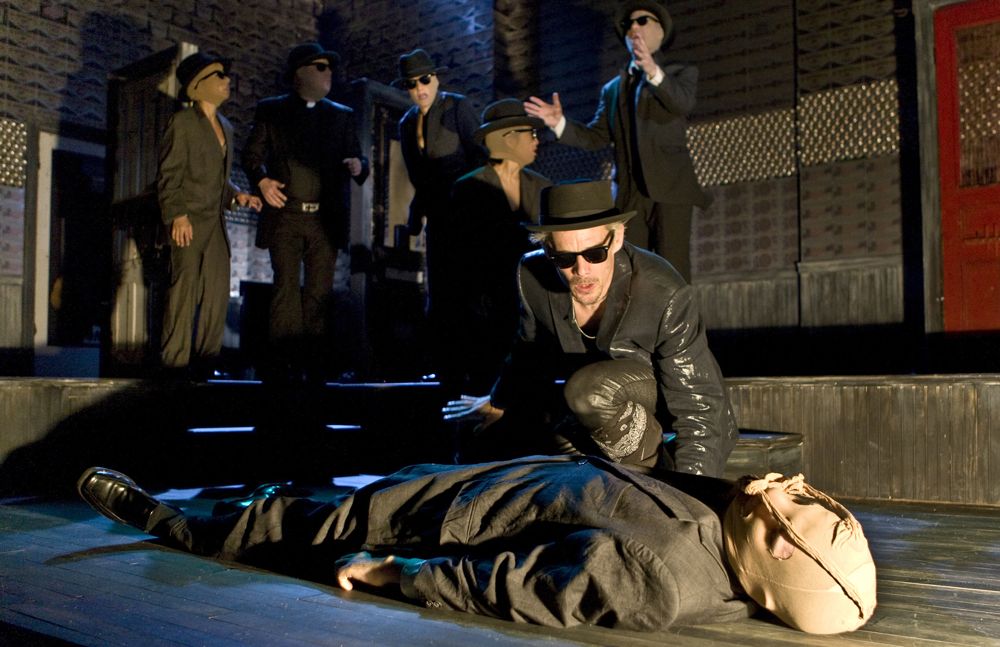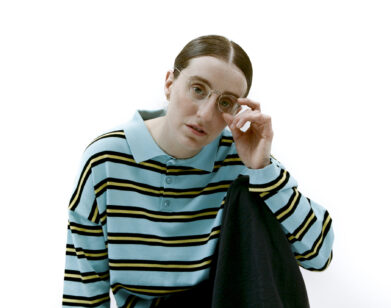Life’s a Baal for Jonathan Marc Sherman

ABOVE: (FROM RIGHT TO LEFT): JONATHAN MARC SHERMAN, ETHAN HAWKE AND ENSEMBLE MEMBERS IN CLIVE.
Four years ago in London, Tom Stoppard gave Ethan Hawke some advice: he should play the titular character in Bertolt Brecht’s first play, Baal (1918). Hawke was in a double bill of A Winter’s Tale and The Cherry Orchard (adapted by Stoppard) at the Old Vic, and he took Stoppard seriously. Who wouldn’t? The actor approached his long-time friend and collaborator, playwright Jonathan Marc Sherman, and a new version of the German play opened on Theatre Row with the New Group yesterday. Written by Sherman and renamed Clive, Hawke plays the Baal character (Clive) and directs the play, and Sherman appears as a ensemble member. “It’s all Tom Stoppard’s fault,” Sherman tells us.
Baal and Clive center around a self-absorbed bard—in Baal, he is a poet, in Clive, a failed rock star—whose behavior removes him from society. It is not a celebration of the cerebral outcast—Clive is cruel and misogynistic—nor is it a celebration of the hedonist: Clive drinks constantly and has sex with young women frequently, but he finds little pleasure in anything. “A deal I made with myself,” says Sherman, “if there was anything [the Baal/Clive character] did in the play, in the original play, that didn’t exist anymore, that people didn’t do to other people that was hurtful anymore, then I didn’t have to write it. And I couldn’t find anything.”
The original play was written before Brecht immersed himself in Epic Theater, but in Sherman’s version actors read stage directions as they enact them. “I liked that it was sort of a later Brechtian thing mixed in with this period of time before he was into that,” Sherman explains. “I wanted to make it clear that it was not a faithful translation or adaptation of Baal. That’s why it’s not called Baal.”
Clive’s cast, an 11-person ensemble, includes Zoe Kazan and Vincent D’Onofrio. Sherman’s worked with almost all of Clive‘s cast before. In the early ’90s, fresh out of college, Hawke and Sherman had a theater company called Malaparte. Their productions featured their actor friends, Generation X poster children like Steve Zahn, Josh Hamilton, and Robert Sean Leonard. While Malaparte fell apart after a few years, Hawke, Sherman, and a growing group of others continued to collaborate on the New York stage. Earlier in the theater season, Sherman and Hawke acted together in Ivanov with the Classic Theater Company.
Before Tuesday’s preview performance, in a lounge lined with photos of Hawke, Kazan, and others on stage in New Group performances, we sat down with Sherman to discuss Stoppard and Baal.
EMMA BROWN: How are the previews going?
JONATHON MARC SHERMAN: They’ve been going well. Responses have been all over the map, but we had people that at least claimed to enjoy it, and enjoy the intensity and enjoy the darkness of it. But we had someone—I actually didn’t hear them—but we had someone who yelled “filth” at the curtain call.
BROWN: Really?
SHERMAN: Oh yeah. We’ve had complaints about the Jesus content and religious content. Which I thought: there’s actually far less than in the original Brecht, so I can’t imagine what that would have been like. So the combination of that stuff makes me really happy because I feel like if it was just one standard response, I probably didn’t do my job correctly. But it’s been a really amazing experience, unlike any other play I’ve ever worked on.
BROWN: Does Tom Stoppard know that you’ve done this? Is he going to come see it?
SHERMAN: He does. He has said he was going to come see it. He came to Ivanov. He read the script—he read the adaptation and gave his stamp of approval, which was a thrilling day in my life and in Ethan’s life. And it was only after that that he said “You know most productions of Baal don’t work, famously.” And it was like: “Now you’re telling us? I actually do sort of know that, but thanks Tom.” It’s got a crazy history; Peter O’Toole did a production of it that some people say was disastrous, but it sold really well because it was Peter O’Toole. Brecht originally wrote it in response to another play [Der Einsame by Hanns Johst] that was glorifying this anti-social artist who lives outside of society. [Brecht] was like “I don’t know about the glorification thing. I think they hurt themselves and a lot of people around them and I’m going to take a look at it in a much more rough way.” I think a lot of people who do the play get sucked into that glorification of the main character.
BROWN: David Bowie played Baal once, didn’t he?
SHERMAN: He sure did, you can YouTube it. I think he put out sort of a mini-album of songs from it and they’re good. What’s tricky about the David Bowie Baal is that he’s David Bowie, so he’s fantastic at being David Bowie. It’s such a difficult part that you need an extraordinary actor to pull it off and David Bowie’s David Bowie, so his acting is not particularly great in it. Rainer Werner Fassbinder played it under the direction of Volker Schlöndorff in 1970 for German television. The strangest people have played this part and been obsessed with this play, so we’re happy to add our names to that long list of lunatics. [Stoppard’s] claimed he’s coming back for it. As well he should.
BROWN: You should send him any bad reviews.
SHERMAN: It also dawned on me when we already far too deep into and I had fallen far too much in love with the project to bail out, he suggested to Ethan that he should play the part. This is someone who has done many adaptations of his own. He didn’t say, “And let me adapt it for you.” I noticed he didn’t do that. For better or for worse, he’s the one who got the ball rolling. I’m very thankful, all kidding aside, that he didn’t offer to adapt it.
BROWN: In the program, you have this quote from the playwright and critic Eric Bentley about how, when Brecht looked back at the play 30 years later, he said it was about the search for happiness. Do you think that is actually the subject of the play?
SHERMAN: I think that was a really clever way of twisting people and making them think about “Is that what he’s really doing?” He goes deeper and deeper in his descent in the search for something that makes him feel something. One of my dearest friends was a cutter in high school, and I’ve thought a lot about that: “I know it’s damaging, but I’ve got to feel something.” There is this period of time in your life where everyone seems on the edge of excess: “Oh, we’re doing crazy things ’cause we’re in college” or “crazy things ’cause we’re in our 20s.” There are people that never stop doing those crazy things and it starts damaging everybody around them. From Clive’s perspective, he can think it’s actually about that—”I’m just searching for what works for me.” That’s, of course, an incredibly narcissistic way to think, to live one’s life. I do think [Brecht] was taking that idea of just thinking of your own personal satisfaction and not taking into account anybody else to its terrifying logical extreme.
BROWN: You mentioned that you first read the play during a Labyrinth retreat at Bard. How many people from that first reading ended up in the cast?
SHERMAN: It’s just Ethan, but that’s partially because with each reading we tried to answer some question for ourselves and try something that would save us rehearsal time later on—some big decision. The Bard reading, because there’s so much misogyny in the subject matter, we thought, “What if Clive and Doc were the only two men in the cast and the rest of the world were women?” What interesting things would come out of that? We realized quickly that we didn’t want to do the production that way, we both found that would have been gimmicky, that would have felt cutesy. It’s just not the play for that. It’s a real look at a man who treats women and men and animals and the world very badly. But we wouldn’t have known that unless we’d seen it.
BROWN: How did you first meet Ethan?
SHERMAN: Ethan and I met in the ’80s. He did Dead Poets Society (1989) with Bob [Robert Sean] Leonard, who was in the Young Playwrights Festival with me, and Josh Charles, who I went to summer camp with. So when they got back, me and Bob and Josh Hamilton were the Young Playwrights Festival people and then Ethan and Bob and Josh Charles were the Dead Poets people, and Jamie Waterston, and we sort of merged the two groups as young guys in New York City who had too much time on their hands and wanted to do theater. And Ethan and I were the two that talked the most and stayed up the latest. After I graduated from college, Ethan and myself and Josh Hamilton took a road trip across the country and back and said, “We’re going to start a theater company” and ended up doing it [the Malaparte theater company].
BROWN: Is Malaparte still in existence?
SHERMAN: Technically, no. But we think of this as a Malaparte experience, it just happens to be a New Group show. Or we did a show at Playwrights Horizons that felt like a Malaparte show to us. The idea behind Malaparte was freewheeling enough that it works for all of us but technically no, we really were functioning for about three years. Nobody particularly wanted to produce. We had writers and actors. Laurie Metcalf actually said something great to Ethan when they worked on A Lie of the Mind, which is: “Of course you guys’ theater company couldn’t stay together, you guys had options. Steppenwolf worked because we had to figure out how to get along. We were in Chicago, and nobody knew us, and by the time anybody knew us, we were already eight years in. If any of us had any options, we would have fallen apart.” And that’s sort of what happened. It’s like, “Oh, we can’t do it because this person’s doing a movie and this person’s doing a play here and this person’s doing this.” Now, I think that if you get two or more Malaparte people working on the same show at the same time, it feels like it’s a Malaparte experience. That’s why it was started, because we all were like, “We’re hanging out all the time together, but nobody is putting us in the same plays.” So it was mainly created so we could put ourselves in the same plays. So now we have the opportunity to do that. Like [Clive actor] Brooks [Ashmanskas] was a Malaparte member. And Jeff Croiter, who designed the lights, designed our Malaparte plays. I’ve known him for 20 years now.
BROWN: Is it important for you to keep acting?
SHERMAN: It’s happened twice this year, everyone’s making fun of me for it. Both times it happened, Ethan’s to blame. The first time Ethan and Austin Pendleton are to blame, the second time Ethan and Scott Elliott are to blame. I love doing it, I really enjoy it. It’s never bad for writing. It’s how I started writing to begin with. From the simplest thing of like, “Oh, right, dialogue is much easier to memorize than those long monologues I really like to write.” But getting to spend 50 performances inside the structure of a Chekhov play [Ivanov] this year and getting to spend this time in a totally changed Brecht structure is a real gift to the side of me that writes. I don’t like to audition and I don’t like to shave and I’m not particularly good at selling myself, so you probably won’t see a whole lot more of me doing it. I’m not going to play Hamlet in the Park this summer. But I am having a good time.
BROWN: Are you nervous about your official opening night? Or is it not such a big deal now that you’re in previews and have already performed to an audience?
SHERMAN: Yes and no. It’s wildly out of my control. I can only work on the things that I can work on. It also feels very different to be working on theater with a beautiful wife and two beautiful children. That was not the case for most of the theater I’ve worked on. It definitely puts me in a different mind space about how important or unimportant all of it is. For this, it’s the show we want it to be, but I fully expect the critics’ aluminum bats and sharpened blades to come after it. To come back to Stoppard, he had adapted a Schnitzler play; in this wonderful Paris Review interview with him he said something along the lines of “It wasn’t until I opened my Schnitzler adaptation that I realized how many critics turned out to be Schnitzler purists.” It’s so not a pure version, on any level, so I just try to do my job and always hope that there’s one person in every audience that something hits in an interesting way. If that’s the case then I feel really happy about it, ’cause that’s what happened to me, that’s how I got into all of the theater. It was like, “Oh, this world’s interesting, I could do this with my life—that’s another, different way to go than being mathematician.”
THE NEW GROUP PRODUCTION OF CLIVE IS CURRENTLY RUNNING AT THE ACORN THEATER ON THEATRE ROW. FOR MORE INFORMATION OR TO PURCHASE TICKETS, VISIT THE NEW GROUP WEBSITE.






